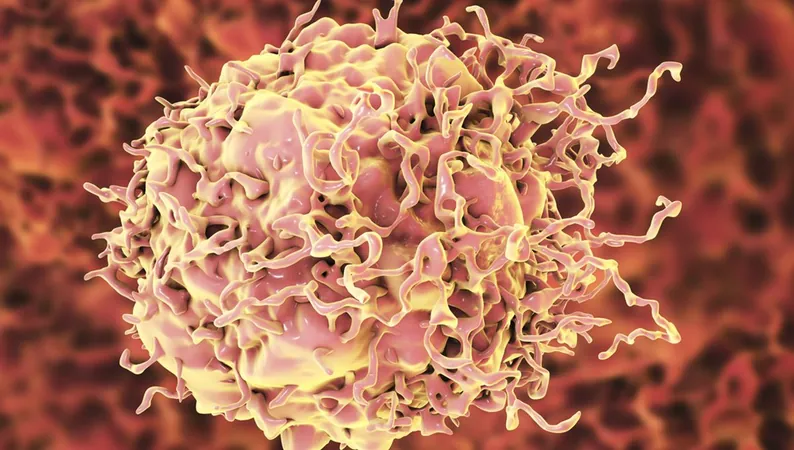
Revolutionary Breakthrough: Scientists Unlock Method to Transform Cancer Cells into Normal Cells!
2024-12-26
Author: Jessica Wong
Revolutionary Breakthrough: Scientists Unlock Method to Transform Cancer Cells into Normal Cells!
In an extraordinary advancement, a team of researchers has unveiled a groundbreaking technology that can revert certain cancer cells back into a state that closely resembles normal, healthy cells, without causing their destruction. This innovative approach holds the promise of revolutionizing cancer treatment, sidestepping the damaging side effects often experienced by patients undergoing conventional therapies, and potentially neutralizing the risk of treatment resistance.
A New Therapeutic Strategy
The concept of cancer cell reversion is not entirely new; however, it has now garnered significant momentum as an emerging therapeutic strategy. Typically, cancer cells are classified as "undifferentiated," losing the specialized traits that distinguish them from normal cells. The new research demonstrates that by reactivating the expression of differentiation-related genes—which are commonly suppressed or mutated in cancerous cells—it is possible to restore their normal functions.
This process can even lead to a phenomenon known as "trans-differentiation," allowing these cancer cells to transform into entirely different, specialized types of cells—such as redirecting breast cancer cells to develop characteristics of liver cells.
Previous Research Successes
In prior studies, scientists have successfully instigated this reversion in various forms of cancer, including myeloid leukemia, breast cancer, and hepatocellular carcinoma (a form of liver cancer). However, a comprehensive catalog of the so-called "master regulators"—specific genes or proteins that govern the differentiation process—has remained elusive until now. Identifying these master regulators is crucial, as they could allow researchers to effectively manipulate cancer cells, steering them back toward a non-cancerous state, thereby providing novel or supplemental avenues for treatment.
Leading Study Insights
Leading the latest study is Professor Kwang-Hyun Cho from the Department of Bio and Brain Engineering at the prestigious Korean Advanced Institute of Science and Technology (KAIST). The research team focused on the observation that throughout the process of oncogenesis—the complex series of changes that normal cells undergo to become malignant—normal cells initially follow a differentiation pathway but regress along it as they transition to cancer.
This insight led to the development of a pioneering technological approach, creating a "digital twin" of the gene network linked to a healthy cell's differentiation journey. By simulating this network, the researchers adeptly identified the master molecular switches responsible for inducing normal cell differentiation.
Remarkable Transformation
When these identified switches were applied to colon cancer cells, the transformation was remarkable—the cells reverted to a normal-like state. Extensive molecular and cellular experiments performed on animal models validated these findings, marking a significant milestone in cancer research.
Systematic Achievements in Cancer Treatment
This innovative method demonstrates that the reversion of cancer cells can be methodically achieved through the creation and analysis of digital twins of cancer cell gene networks, laying the groundwork for systematic cancer treatments rather than relying on chance discoveries. Experts believe this discovery could pave the way for new reversible cancer therapies applicable across various cancer types.
Expert Perspectives
Professor Cho expressed enthusiasm about the findings, stating, “The ability to revert cancer cells back to normal cells is a remarkable phenomenon. This study establishes that such reversion can be systematically induced.” He further emphasized the innovative nature of this research, asserting, “This work presents a novel framework for reversible cancer therapy by transforming cancer cells into normal cells and provides foundational technologies for pinpointing reversion targets through detailed analyses of normal cell differentiation pathways.
Future Implications
As this cutting-edge research continues to unfold, the medical community and cancer patients alike may soon benefit from therapies derived from this revolutionary approach, offering hope for enhancing treatment efficacy and improving patient outcomes. Stay tuned as we follow these developments!


 Brasil (PT)
Brasil (PT)
 Canada (EN)
Canada (EN)
 Chile (ES)
Chile (ES)
 España (ES)
España (ES)
 France (FR)
France (FR)
 Hong Kong (EN)
Hong Kong (EN)
 Italia (IT)
Italia (IT)
 日本 (JA)
日本 (JA)
 Magyarország (HU)
Magyarország (HU)
 Norge (NO)
Norge (NO)
 Polska (PL)
Polska (PL)
 Schweiz (DE)
Schweiz (DE)
 Singapore (EN)
Singapore (EN)
 Sverige (SV)
Sverige (SV)
 Suomi (FI)
Suomi (FI)
 Türkiye (TR)
Türkiye (TR)